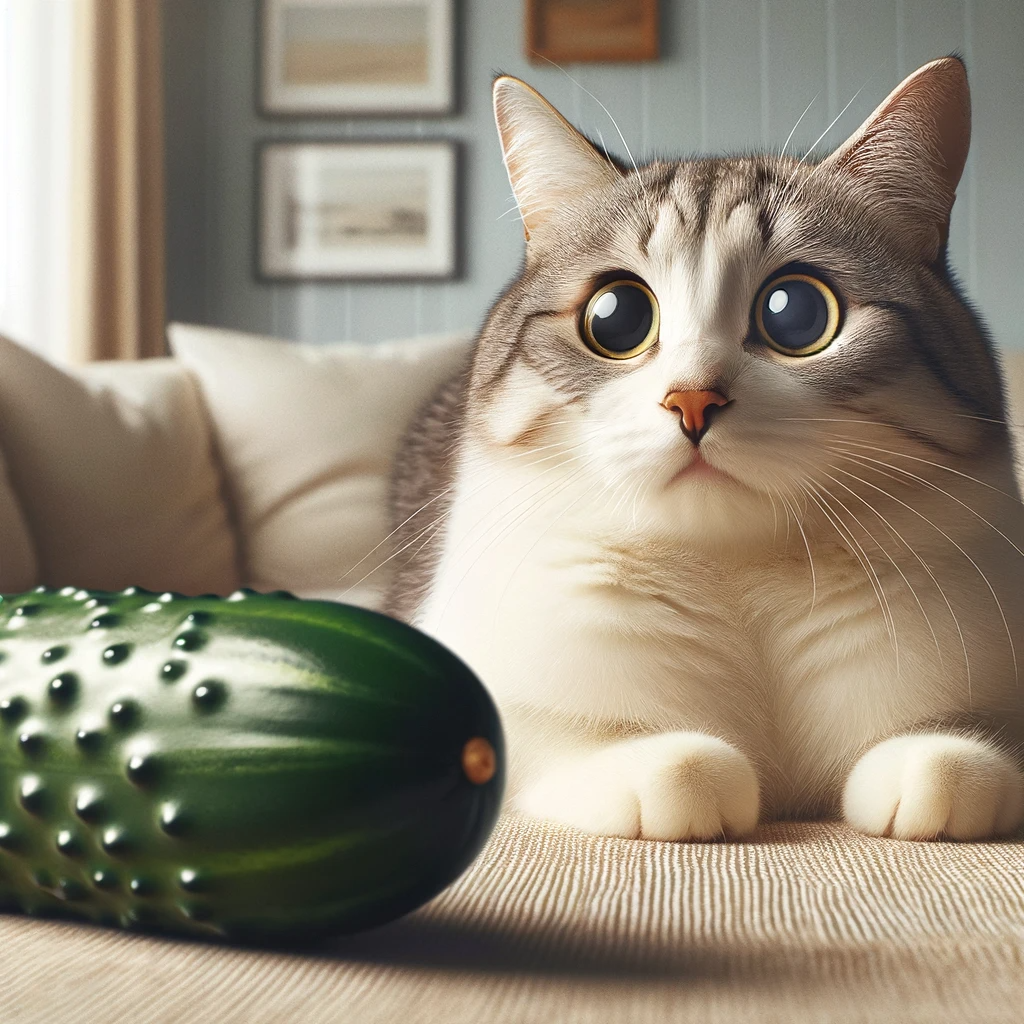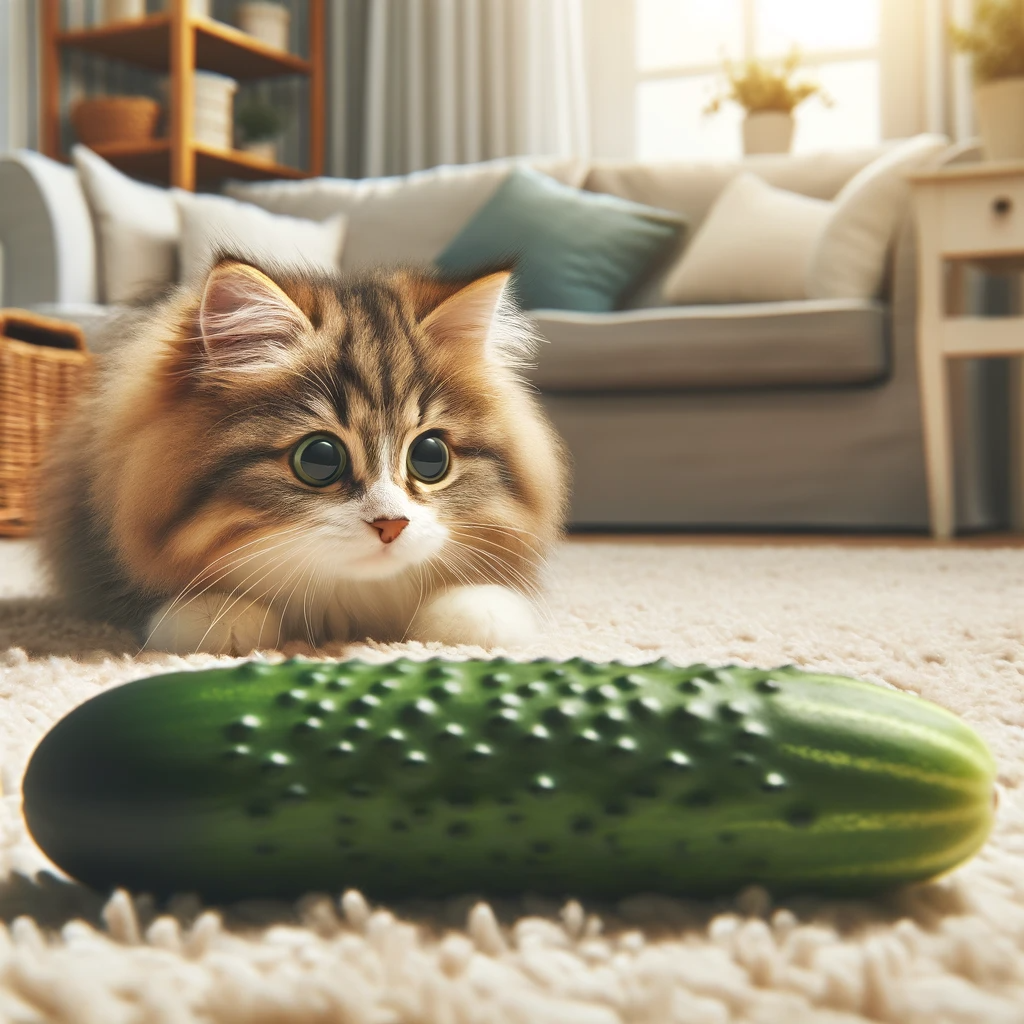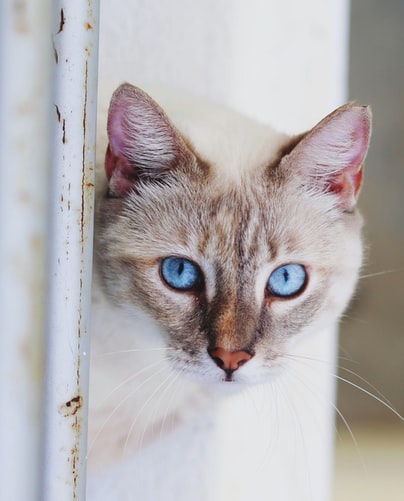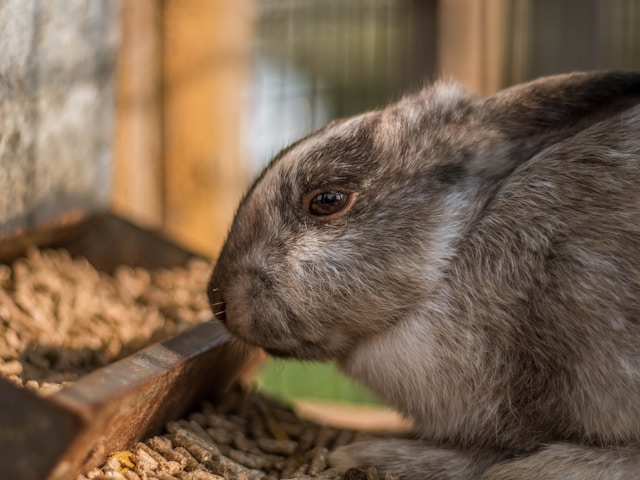The internet is bustling with videos showcasing cats leaping high into the air at the sight of an innocuous cucumber, sparking both laughter and curiosity. At Purr Patio, we’re unravelling this feline mystery: Why are cats scared of cucumbers? This phenomenon, while amusing on the surface, opens a window into the intricate workings of cat psychology and their instinctual responses.
Our blog delves into the reasons behind this peculiar fear, examining factors ranging from the evolutionary instincts of cats to their perception of their environment. Cats, known for their sharp senses and alertness to changes in their surroundings, may perceive the sudden appearance of a cucumber as a threat, triggering a swift and often dramatic response.
We also explore the implications of startling cats in this manner, discussing the potential stress and anxiety it can cause our feline friends. Understanding the roots of this fear is not just a matter of satisfying curiosity but also a step towards better and more empathetic pet care. Join us at Purr Patio as we decode the mysteries of our beloved pets, starting with this peculiar cucumber conundrum.
Why Cucumbers Frighten Cats
Cucumbers are deliciously crisp, crunchy vegetables packed with nutrients that provide health and beauty benefits. Cucumbers are often recommended as part of a wellness regime to promote good health.
Videos showing cats being scared away by cucumbers have gone viral in recent years; however, experts caution against intentionally frightening your cat with them or any other objects.
This table provides a comprehensive overview of various aspects related to why cats may be scared of cucumbers, focusing on their behaviour, psychology, and the implications of startling them, which is valuable for promoting responsible and empathetic pet care.
| Aspect | Details |
|---|---|
| Behavioural Explanation | Cats may perceive cucumbers as a threat due to their instinctual responses to unexpected or unfamiliar objects. |
| Cat Psychology | Cats have a heightened sense of alertness and are sensitive to changes in their environment. |
| Evolutionary Instincts | This reaction may stem from cats’ natural instincts to avoid snakes or other potential dangers in their surroundings. |
| Stress and anxiety in cats | Startling cats with cucumbers can cause unnecessary stress and anxiety, potentially leading to behavioural issues. |
| Safety Concerns | Startling a cat can result in injury if the cat attempts to flee quickly or jump high. |
| Alternative Stimulation | Providing appropriate environmental enrichment and play is a safer way to engage a cat’s instincts and curiosity. |
| Expert Opinions | Animal behaviourists and veterinarians discourage startling cats for entertainment purposes. |
| Understanding cat behaviour | Recognising and respecting a cat’s reactions and boundaries is important for their well-being. |
| Responsible pet ownership | Responsible cat ownership involves creating a safe and comfortable environment free from unnecessary stressors. |
| Purr Patio’s Role | Purr Patio provides insights into cat behaviour and promotes better understanding and care for cats. |
Cats vs Cucumbers
Have you seen those videos on social media where cat parents shock their pets by hiding a cucumber behind them and watching as their cats turn around and react to the sudden threat? While such videos may be entertaining to watch, remember, this should never be done to your animal! Although this kind of trickery might make for entertaining viewing, it should never be used against your pet.
Cucumbers often look like snakes and scare cats due to their long, narrow shape. Although this reaction might appear unreasonable to us humans, felines react in this manner due to their natural predatory instincts; being surprised can put them in risky situations that they otherwise wouldn’t encounter.
Cats possess strong senses of smell and hearing that can easily spook them, which makes ensuring your home is free from clutter and loud sounds essential if you want your cat to rest or sleep peacefully. In nature, cats act both as hunters and prey, thus requiring constant alertness. While naturally curious cats should know when it’s best to remain calm,.
Note that cucumbers in these videos were often placed behind cats while they ate, drank, or used their litter box; this poses a danger because the animal must now face an unexpected cucumber that wasn’t there when expected, which causes their involuntary startle response and may lead to stress and aggression in response.
Why Cats are Startled?
Cat owners have recently become popular for placing cucumbers close to their cats and recording their extreme reactions. While these videos can often be funny, it is important to understand why cats behave this way—it could be that the cucumber reminds them of snakes or simply startles them into responding differently than expected!
When they sense something unfamiliar in their home environment, cats may become afraid and anxious. This reaction is natural as part of their natural instinct to keep themselves safe and avoid predators; thus, they may pounce or flee when hearing loud noises or when startled by someone new entering their space.
Ouch! While it might be tempting to play an affordable cat funny viral video prank on your cat with cucumber slices in order to produce an entertaining viral video, this can be hazardous for their wellbeing. Intentionally startling your pet may lead to injuries or breaks due to panic, as well as stress and anxiety issues for themselves and you.
Cats typically expect their home environment to be unthreatening and predictable. When an unexpected surprise, such as an unfamiliar object like a cucumber, unexpectedly appears in one of their usual spots, such as eating too little, stretching excessively, or using the litter box outside its designated space, it may cause distress and anxiety in them, resulting in unwanted behaviours like food aversion, increased stretching, or toileting outside its designated box.
Playing tricks on your pet might seem tempting, but this should be avoided for its possible negative health and well-being effects as well as for showing them which parts of their home could be dangerous. Instead, spend quality time bonding with them and using positive reinforcement techniques to encourage relaxation.
Cats are Sensitive
Cats are acutely aware of their environment and constantly scan it for threats that might harm them. Their evolutionary instincts keep them on high alert, and any stimulus may trigger a fight or flight response from them. Therefore, it’s essential that when surprising cats with objects like cucumbers, you do so with care, as too much fear can make your cat flee rather than investigate and learn that something does not pose a threat, leading to aggression, urine marking, and/or pooping outside the litter box being observed as behaviours associated with their surprise encounter.
Cucumbers may frighten cats due to their resemblance to snakes. Wild cats are always on guard against potential threats that could sneak up behind them and their long shape reminds them of snakes, so when one suddenly appears behind them they become startled as if it weren’t there before!
Cats often react in the same manner to objects placed behind them, such as pencils, cushions, and soft toys, that they’ve become used to seeing suddenly appearing in their field of vision; viral videos show cats jumping at objects such as these when they suddenly appear out of nowhere.
No matter if a cucumber resembles a snake or not, it is important to remember that every cat is unique and reacts differently in different environments. To ensure your feline feels safe in their home and secure within it, do not scare them with laughs or social media likes; doing this too frequently could result in behavioural issues and stress on an everyday basis.
Watching a cat run away from an object like a cucumber might seem amusing, but it can be very stressful for your pet. Therefore, you should never play practical jokes on your cats and try to make them jump at objects such as cucumbers; doing so can cause regular anxiety for both of you as well as potentially hurt them physically if they try and run away from it.
Are Cucumber Pranks for Cats Harmless?

Cucumbers may seem harmless enough, yet many cats seem terrified when they see one. Videos online show cats leaping away when they encounter cucumbers, as it seems that cucumbers have snake-like characteristics that cause anxiety in cats.
Though we all enjoy watching hilarious cat videos and memes, animal experts warn against intentionally scaring your pets, as this could potentially have long-term repercussions.
Fear-scaring your cat with a cucumber can result in anxiety and fear towards other things, including you!
This may lead to all sorts of behavioural issues, including urine marking and litter box avoidance, as well as aggression, and could even increase obesity rates and diabetes risk.
Pranking your cat with a cucumber may make them mistrust you and may lead them to avoid seeking assistance from you in the future. Furthermore, this behaviour could increase their chance of accidents, such as jumping out of windows or climbing into dangerous spaces more easily.
One of the primary concerns with placing your pet in stressful situations is that this can lead to permanent changes in their brains and behaviour that will eventually have long-term repercussions. Don’t scare your pet just for some entertainment online; it is not worth risking stress and possible health complications in the future.
Cucumbers can be an excellent treat for your pet if given in moderation. Packed full of water, vitamins, and minerals (molybdenum being an essential mineral; however, large doses can be toxic), cucumbers also provide important antioxidant protection and contain vitamin C and other powerful antioxidants that benefit their overall wellbeing.
While cucumbers make for a tasty treat for dogs, you should limit how often you offer these crunchy veggies, as their high fibre content can cause gas, vomiting, and diarrhoea in some pups. In addition, only offer your dog organic cucumbers since non-organic varieties may contain pesticides that could harm them.
Can I Give Cucumbers To Cats?
Can cats eat Cucumbers?
Yes indeed.
If you plan to use cucumber as a snack, ensure it has been unwrapped and cut into small slices before offering it as a treat for cats. Remove any seeds that could pose a choking hazard to cats and remove its skin as it contains potentially toxic chemicals.
Furthermore, only offer cucumber as an occasional treat in order to avoid digestive issues such as excess gas and diarrhoea in felines. The best advice would be to seek advice from a vet regarding its use.
Cucumbers should not be given directly to cats, as this could lead to digestive issues and it is wise to consult your vet prior to giving any new foods to them.


